Senator Elizabeth Warren’s urging Trump’s Treasury pick to consider stricter crypto regulations highlights the growing concern over cryptocurrency’s impact on market stability and consumer protection. She emphasizes the need for enhanced compliance with anti-money laundering frameworks, like the proposed Digital Asset Anti-Money Laundering Act. Warren believes that effective regulations can reduce market volatility and increase investor confidence in the crypto space. With agencies like the SEC and CFTC stepping up their scrutiny, it’s clear that the regulatory landscape is shifting. You might find it interesting to explore how these proposed changes could reshape the future of cryptocurrency. Warren’s advocacy for stricter regulations comes in stark contrast to Trump’s approach to crypto deregulation, which has often favored a lighter touch on oversight. As regulatory agencies enhance their vigilance, the future of cryptocurrency will likely depend on balancing innovation with necessary protections. If lawmakers can strike this balance, they may foster a more stable environment that encourages both growth and security within the increasingly popular digital asset market.
Key Takeaways
- Senator Warren advocates for stricter cryptocurrency regulations to enhance anti-money laundering compliance and consumer protection measures.
- The proposed Digital Asset Anti-Money Laundering Act seeks to extend Bank Secrecy Act responsibilities to cryptocurrencies.
- Bipartisan support highlights the necessity for regulatory frameworks to improve market efficiency and investor confidence.
- Increased scrutiny from agencies like the SEC and CFTC emphasizes the importance of protecting consumers and ensuring market integrity.
- Historical market volatility linked to speculative trading underscores the need for comprehensive guidelines to manage crypto-related risks.
Warren's Call for Regulation
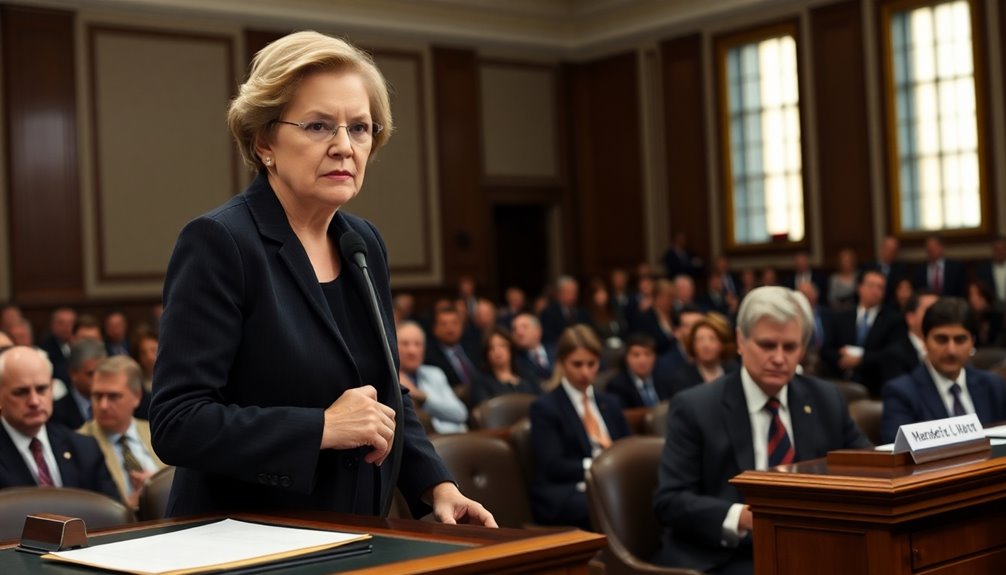
As concerns about cryptocurrency's role in illicit activities grow, Senator Elizabeth Warren is pushing for stricter regulations to address these risks.
She's introduced the Digital Asset Anti-Money Laundering Act, aiming to close loopholes and enhance compliance with anti-money laundering frameworks. This proposal extends the Bank Secrecy Act's responsibilities, requiring Know-Your-Customer measures and transaction reports, especially for unhosted wallets. The emergence of pump and dump schemes has further highlighted the need for robust regulatory oversight in the cryptocurrency market.
With bipartisan support from groups like the Bank Policy Institute and AARP, Warren's call reflects a growing urgency. The lack of comprehensive anti-money laundering protections allows bad actors to exploit crypto for money laundering, terrorism funding, and cybercrime. As the bill is described as the toughest proposal addressing illicit crypto use, it underscores the need for enhanced regulatory measures in the digital asset ecosystem.
Regulatory Scrutiny Intensifies on Crypto
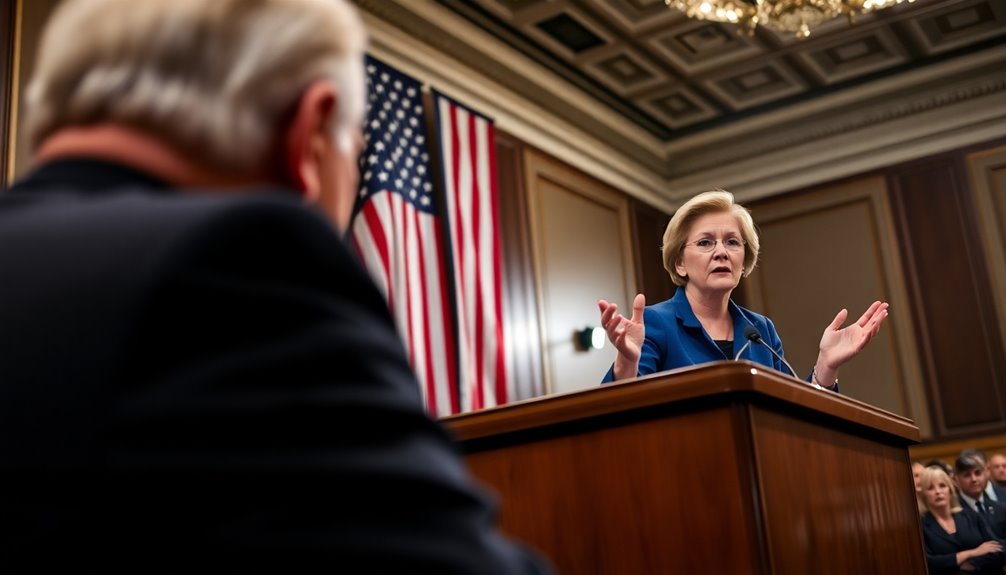
With the rise of cryptocurrency, regulatory scrutiny has intensified, reflecting growing concerns over its potential for misuse.
You're likely noticing that agencies like the SEC and CFTC are stepping up their oversight, focusing on consumer protections and market integrity. Blockchain technology has been central to discussions on how to enhance transparency in transactions.
The DOJ's National Cryptocurrency Enforcement Team is investigating criminal activities, while the Treasury Department collaborates with financial institutions to tackle cyber risks.
Challenges such as chartering requirements and anti-money laundering measures are also on regulators' agendas.
States are enforcing their own laws, adding complexity for crypto firms.
As the landscape evolves, regulators are working towards harmonization, aiming to create an environment that balances innovation with necessary safeguards against fraud and misconduct.
Moreover, federal banking regulators are expected to play a crucial role in overseeing crypto-related activities, focusing on creating a more supportive regulatory framework for innovation.
Crypto Price Volatility Analysis
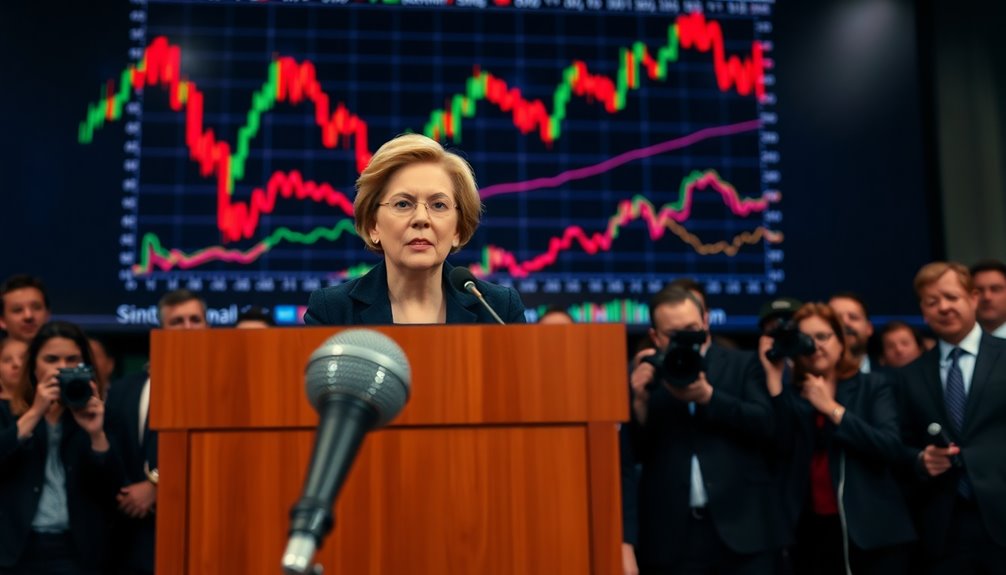
Crypto price volatility remains a key concern for investors navigating this dynamic market. Factors like ongoing price discovery and unique supply-demand dynamics contribute to this volatility. As more participants enter the market, shifting investor sentiment can drive significant price movements. Interestingly, Bitcoin's volatility has declined over time, suggesting a maturing market. Historical trends indicate that lower volatility periods often precede substantial price increases, which offers some hope for investors. Moreover, the crypto market is considered an infant asset class that is still developing, which further emphasizes the potential for future growth.
However, trades by large holders, or whales, can still create sharp price fluctuations due to limited liquidity in smaller assets. Regulatory uncertainty further complicates matters, but clearer regulations could enhance market stability and foster greater investor confidence, ultimately reducing volatility in the long run.
Corporate Blockchain Integration
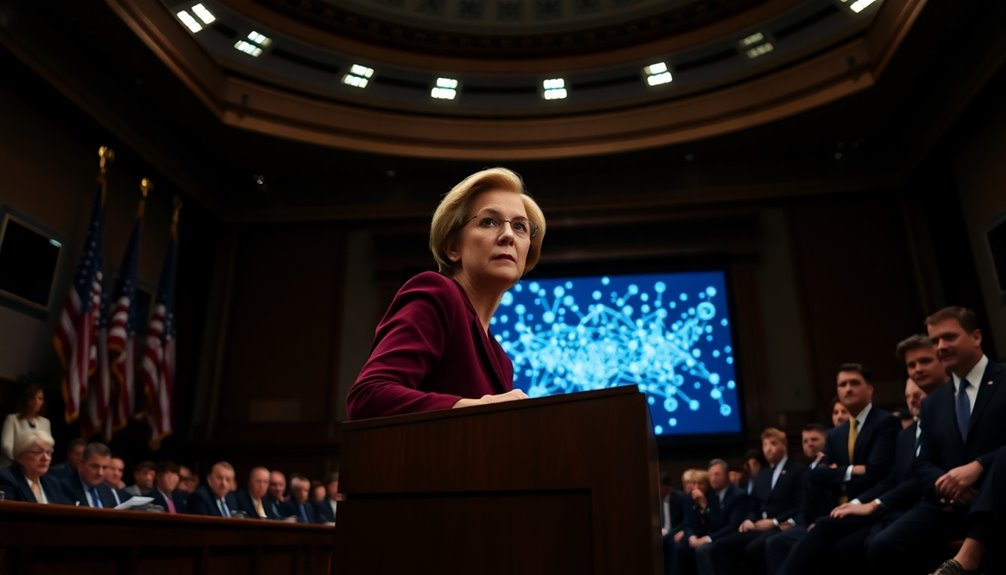
While many businesses are exploring innovative technologies, corporate blockchain integration stands out for its potential to revolutionize operations. By utilizing immutable records, you can ensure data accuracy and enhance security through digital signatures and decentralized storage. This technology allows for real-time monitoring, quickly identifying unauthorized access and cybersecurity threats. Moreover, blockchain boosts transparency in supply chains, making it easier to track products and streamline intercompany transactions. By automating manual tasks with smart contracts, you reduce operating costs and improve efficiency. Furthermore, decentralized storage provides an additional layer of security against data breaches.
Additionally, higher data security through encrypted transactions further enhances the overall reliability of the system. Transactions can be executed instantly, minimizing delays and human errors. Overall, corporate blockchain integration not only enhances data integrity but also speeds up operations and lowers labor costs, positioning your business for significant competitive advantages.
Legislative Impact on Cryptocurrency Markets
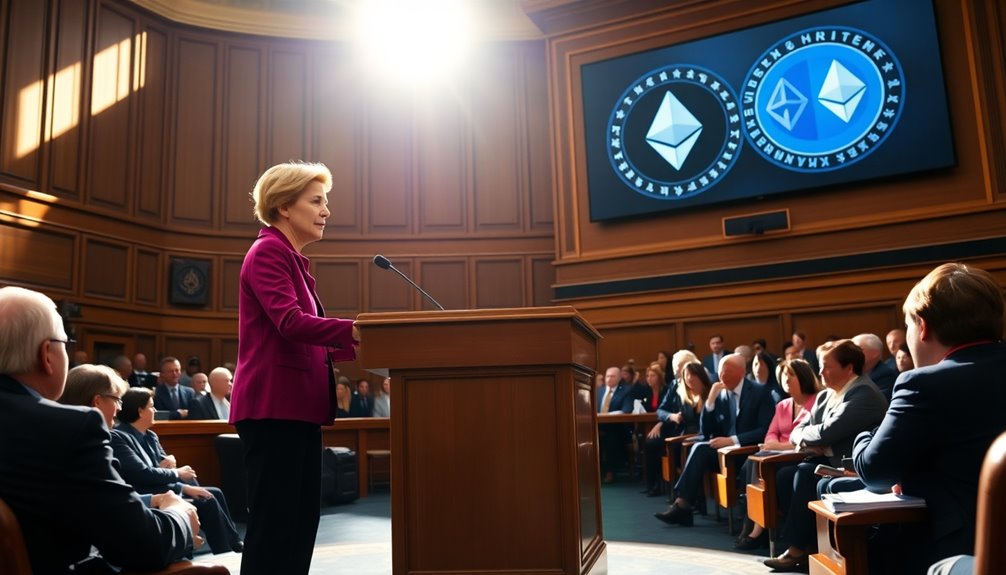
As regulators tighten their grip on cryptocurrency markets, the implications for investors and businesses are becoming increasingly evident.
You'll notice that regulated coins tend to create more efficient markets, offering solid investor protections against manipulation. This mirrors traditional stock exchanges, where regulation fosters transparency. Studies show that most regulated cryptocurrencies yield higher market efficiency, reflecting the positive impact of regulation on market performance. In recent developments, Kenya's regulatory framework could serve as a model for how emerging markets adapt to these changes.
Regulatory changes can also lead to significant market volatility; for instance, China's Bitcoin ban caused sharp price drops. Conversely, positive news, like potential SEC approvals for Bitcoin ETFs, can boost market sentiment. The emergence of new Bitcoin holders who control 50% of the supply highlights the potential for increased volatility in these markets.
As the regulatory environment evolves, expect a shift towards consumer protection and a balanced approach that encourages innovation while ensuring safety.
Ultimately, clearer regulations can enhance your confidence and participation in the crypto space.
Regulatory Trends in Cryptocurrency
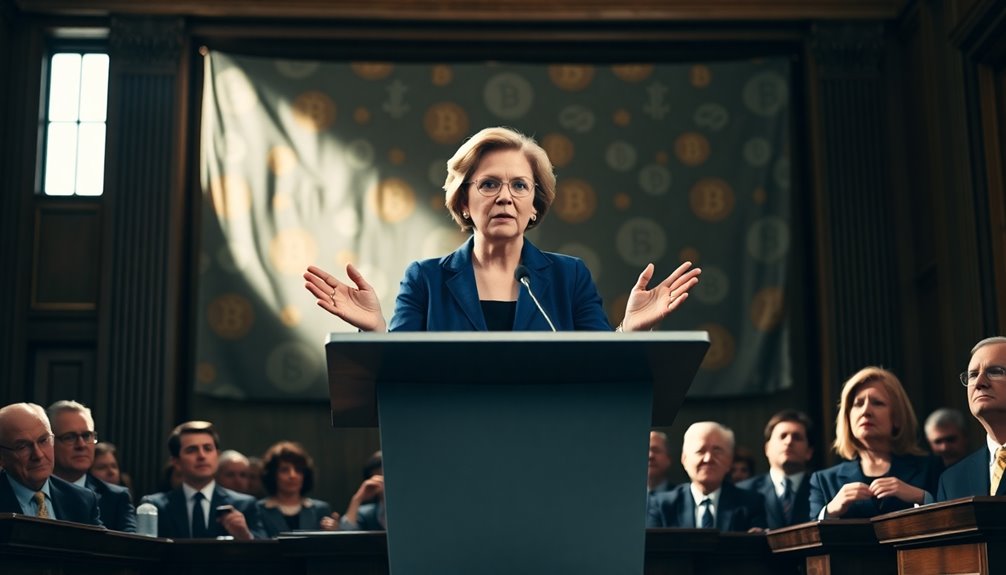
With the landscape of cryptocurrency constantly shifting, understanding the regulatory trends shaping the industry is crucial for investors and businesses alike.
Regulatory frameworks are evolving, with the EU's MiCA providing a comprehensive oversight model and the OECD's CARF establishing new tax reporting standards. The incoming Trump administration's plan for a crypto advisory council signals a move towards clearer regulations. Moreover, the anticipated rise in institutional demand for digital assets highlights the need for a robust regulatory framework to support this growth.
However, challenges remain, including consumer protections and a fragmented jurisdictional authority. Compliance is becoming more complex, with new reporting requirements like Form 1099-DA, wallet-by-wallet tracking, and enhanced disclosure obligations.
As states like Wyoming adopt progressive regulations, the regulatory environment is becoming increasingly dynamic, demanding that you stay informed and adaptable to navigate these changes effectively.
Frequently Asked Questions
What Specific Regulations Does Senator Warren Propose for Cryptocurrencies?
Senator Warren proposes several regulations for cryptocurrencies.
She wants to extend anti-money laundering laws to include Know-Your-Customer requirements, mandate reporting of suspicious transactions, and regulate large peer-to-peer transactions.
She also emphasizes closing loopholes in the digital asset ecosystem to combat illicit activities.
Additionally, she calls for enhanced reporting requirements under the Bank Secrecy Act and stronger regulatory oversight to ensure compliance across all entities involved in digital assets.
How Would Stricter Regulations Affect Cryptocurrency Innovation?
Imagine a vibrant garden, where creativity blooms freely. Stricter regulations can act like a heavy frost, stifling that growth.
You'll notice companies diverting resources from innovation to meet compliance demands, leading to fewer startups and less experimentation. The fear of penalties may make you hesitant to explore bold ideas, pushing innovation to more welcoming environments.
Ultimately, while regulations might protect consumers, they can also chill the entrepreneurial spirit vital for progress in cryptocurrency.
What Are the Potential Consequences for Non-Compliant Cryptocurrency Companies?
If you run a cryptocurrency company and don't comply with regulations, you'll face serious consequences.
You could incur hefty fines, lose customer trust, and damage your reputation, making it tough to attract new clients.
Additionally, non-compliance increases your vulnerability to cyberattacks, risking sensitive data.
Unexpected costs from legal fees and fines might divert resources from growth, ultimately jeopardizing your financial stability and operational efficiency.
How Do Other Countries Regulate Cryptocurrencies Compared to the U.S.?
When you compare how other countries regulate cryptocurrencies to the U.S., you'll notice significant differences.
The EU's MiCA requires licenses for issuing and trading, while Japan embraces a more crypto-friendly environment.
South Korea's recent laws enhance user protection, whereas China takes a strict stance by banning most crypto activities.
Meanwhile, the U.K. mandates FCA authorization for digital currency firms.
Each approach impacts market dynamics and user protections differently, which you should consider when navigating these regulations.
What Role Do Investors Play in Shaping Cryptocurrency Regulations?
Did you know that nearly 40% of U.S. adults have invested in cryptocurrency?
As an investor, you play a vital role in shaping regulations. By advocating for stronger fraud prevention and transparency, you help protect your interests and those of others.
You can influence regulatory bodies like the SEC to focus on market integrity and consumer protection, ensuring a safer environment for all participants in the growing cryptocurrency landscape.
Conclusion
In the ever-shifting sands of cryptocurrency, Senator Warren's call for stricter regulations is like a lighthouse guiding ships through a stormy sea. Without clear rules, investors risk capsizing in turbulent waters. As the crypto market faces intense scrutiny, think of it as a game of chess; strategic moves can protect your assets. Embracing regulation might seem daunting, but it could ultimately stabilize the market, ensuring everyone plays by the same rules and navigates safely toward profitability.









